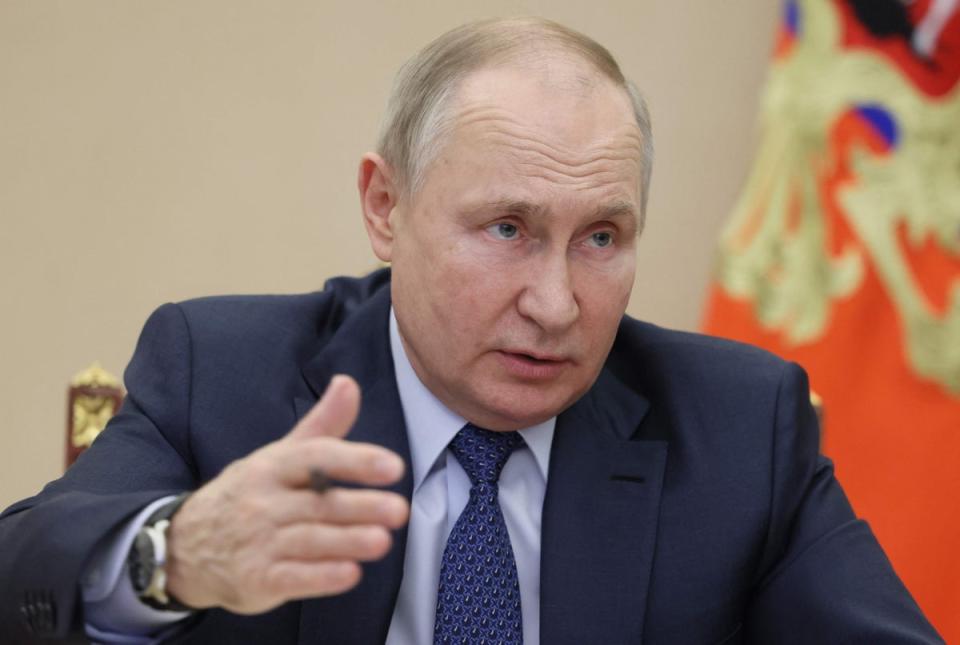OPINION - Putin is losing the ground war, but Europe must dig in for the economic battle

There is more than one front in Europe’s almost 10- month-long war. The first is in the mud, where the worst trenches and dugouts in Eastern Ukraine are starting to bear more than a passing resemblance to scenes from the First World War. The second can be seen from space: Ukraine plunged into darkness from blackouts and assaults on its critical infrastructure as the illuminated cities of Europe glow into the night all around it. The third frontline can be felt in every bank account in Britain: the mounting costs of the economic war between Russia and the West.
President Zelensky and his team, looking at the first two frontlines, have every reason to toast the incoming new year. Ukrainian forces, under the supreme command of General Valerii Zaluzhnyi — whose counter-offensives have already won himself a place in military history — have driven the Russian occupation out of Kharkiv oblast and the city of Kherson. Six months ago, officials in the US National Security Council were sceptical that such a thing was even possible. Meanwhile, in urban Ukraine — on the second frontline that is public opinion — Russia’s attempt to break the nation’s will to fight through the constant bombardments of what powers and heat them has failed miserably. Through the rolling blackouts there is nothing less than a Blitz spirit.
It’s on that third frontline that Zelensky and his advisers have reason to worry. They know full well that Western European officials are growing anxious that the energy crisis fuelled by the war is starting to really hurt. In private, French and German officials now routinely speak of the US as the war’s only winner: its gas and arms exports booming, its dominance of European affairs underlined and the army of its old rival ravaged by spending only a small fraction of its defence budget. Europe, meanwhile, has seen its economic competitiveness vanish overnight: as Europeans pay more for their energy, their manufacturing becomes more expensive to sell and less attractive to buy on the world market. From investment to productivity, the indexes that worry politicians are flashing red. Russia’s war is only killing Ukrainians but is making all Europeans poorer.
Right now Europe and Russia have surprised each other with their resilience. Western sanctions are having a profound impact — drying up growth, hampering war production and dashing the fortunes of oligarchs — but Western officials are more than disappointed at how successfully the Russian Central Bank has navigated the storm. They had hoped for more. Meanwhile, Russian sanctions on the West have let down Vladimir Putin. In an operation almost as unprecedented as those as General Zaluzhnyi, the free continent’s gas supplies were restocked before winter from alternative suppliers. Many in Washington had thought such a feat impossible.
Both sides are pointing to the long haul: recasting their sanctions not as a quick win but as a slow grind. Allied officials detect a financial crunch and brewing banking crisis in Russia. Kremlin officials point to Europe’s far harder task of restocking their gas supplies for next winter — when, it is assumed, the Chinese will have exited their Covid-zero policy and will be competing with Europe again on the open market for the same gas. Meanwhile, as the frontlines in Ukraine hold steady, the economic war is escalating. Russia has threatened to respond to the West’s bold attempt to create a buyer’s cartel refusing to pay more than $60 a barrel for oil. This could include banning sales to any countries now complying with it. Neither side can lift its sanctions: that would vastly benefit the other.
There is nothing better one can do to understand the war in Ukraine than listen to what Putin is actually saying. This week, with his trademark smirk, the Russian ruler boasted that while the war in Ukraine “may be a long process” it had resulted in “new territories for Russia.” The Sea of Azov, he continued, had become a Russian “inland sea,” something, he bragged, that eluded even his idol Peter the Great.
In his most recent intervention, any pretence that the war was about Nato membership or Russian minority rights has slipped away. It is a war of conquest: as pure and simple as those of any 18th- century Tsar. These delusions have not just cost the lives of countless Ukrainians. They are exacerbating the decline of all Europe: pushing its democracies further behind the US economically and making Russia itself ever more dependent on China.

 Yahoo Finance
Yahoo Finance 